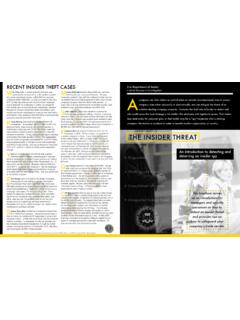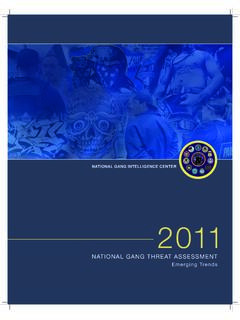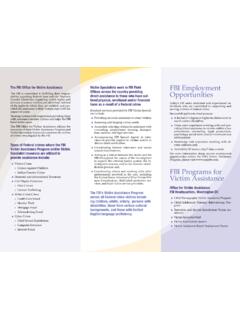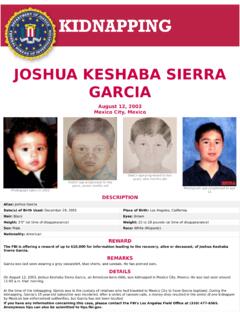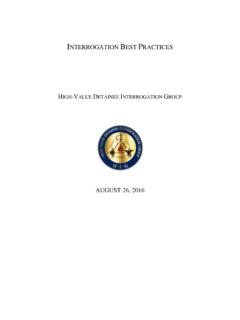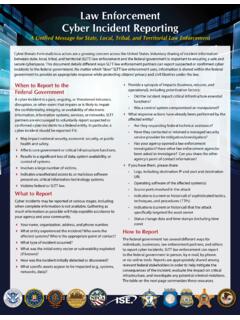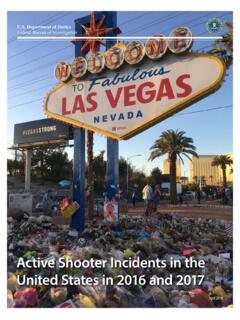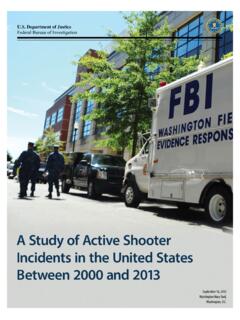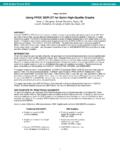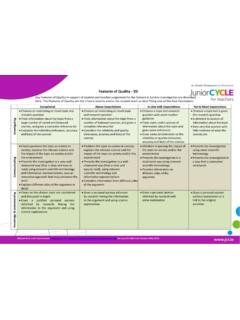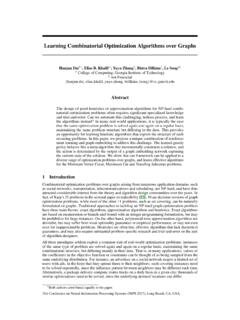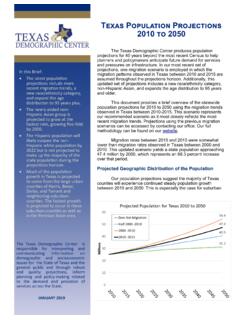Transcription of Quality Assurance Standards for Forensic DNA Testing …
1 APPROVED by the Director of the Federal Bureau of Investigation to take effect July 1, 2020 1 of 41 Quality Assurance Standards FOR Forensic DNA Testing LABORATORIES EFFECTIVE DATE: These Standards shall take effect July 1, 2020 and shall not be applied retroactively. 1. SCOPE AND APPLICABILITY This document consists of definitions and Standards . The Standards are Quality Assurance measures that place specific requirements on the laboratory. Equivalent measures not outlined in this document may also meet the standard if determined sufficient through an accreditation process. The term year refers to calendar year in these Standards . Also, when used in these Standards , the terms review , approve , document , define , schedule , policy , procedure , program , appoint , notify , inform , authorize , or designate are intended to require written documentation to demonstrate compliance.
2 In order to demonstrate compliance with these Standards for purposes of the audit and accreditation process, the laboratory shall have available objective proof of satisfying each standard. The Standards describe the Quality Assurance requirements that laboratories performing Forensic DNA Testing or utilizing the Combined DNA Index System (CODIS) shall follow to ensure the Quality and integrity of the data generated by the laboratory. As it pertains to these Standards , Forensic DNA Testing begins at sample extraction or direct amplification. These Standards are applicable to Forensic DNA Testing laboratories using Rapid DNA instruments/Systems on casework reference samples. The use of Rapid DNA instruments/Systems is not approved for use on Forensic samples.
3 These Standards also apply to vendor laboratories that perform Forensic DNA Testing in accordance with Standard 17. These Standards do not preclude the participation of a laboratory, by itself or in collaboration with others, in research and development, on procedures that have not yet been validated. 2. DEFINITIONS As used in these Standards , the following terms shall have the meanings specified: Accreditation is the formal recognition that a laboratory meets or exceeds a list of Standards , including the FBI Director s Quality Assurance Standards , to perform specific tests. Accreditation is administered by a nonprofit professional association of persons actively involved in Forensic science that is nationally recognized within the Forensic science APPROVED by the Director of the Federal Bureau of Investigation to take effect July 1, 2020 2 of 41 community in accordance with the provisions of the Federal DNA Identification Act (34 12592) or subsequent laws.
4 Accuracy is the ability of a measurement to give results close to a true value. Administrative review is an evaluation of the report and supporting documentation for consistency with laboratory policies and for editorial correctness. Analyst (or equivalent role, position, or title as designated by the laboratory) is an employee or contract employee, that has successfully completed the laboratory s training requirements for casework sample analysis, passed a competency test, and has entered into a proficiency Testing program according to these Standards . This individual can conduct and/or direct the analysis of Forensic samples, interpret data, reach conclusions, and generate reports. Analytical control is a sample used to demonstrate that a method works correctly and to ensure the data are valid.
5 See Positive amplification control, Positive sample control, Positive sequencing control, Negative amplification control, Negative sample control, Negative sequencing control, and Reagent Blank Control. Analytical documentation is the documentation of procedural notes, controls, and instruments used; observations made; results of tests performed; and charts, graphs, photos, and other documentation generated which are used to support the analyst s conclusions. Analytical procedure is an orderly, step-by-step process designed to ensure operational uniformity and to minimize analytical drift. Analytical threshold is the minimum height requirement, determined through validation Testing , at or above which detected peaks/signal can be reliably distinguished from background noise; peaks/signal at or above this threshold are generally not considered noise and are either artifacts or true alleles.
6 Annual is once per calendar year. Audit is an on-site inspection used to evaluate, confirm, and/or determine the extent to which specified requirements are fulfilled. Audit team is one or more individuals, including at least one auditor, that performs an inspection of a laboratory. At least one audit team member shall be or have been an analyst previously qualified in the laboratory s current DNA technologies and platforms. Auditor is an individual who has successfully completed the FBI s DNA auditor training course. Binary method is an approach for which there are only two values (possible or not possible) for each decision. APPROVED by the Director of the Federal Bureau of Investigation to take effect July 1, 2020 3 of 41 Biochemistry is the study of the nature of biologically important molecules in living systems, DNA replication and protein synthesis, and the quantitative and qualitative aspects of cellular metabolism.
7 Casework CODIS administrator (or equivalent role, position, or title as designated by the laboratory) is an employee of the laboratory responsible for administration and security of the laboratory s CODIS at a laboratory performing DNA analysis on Forensic and casework reference samples. An alternate casework CODIS administrator must be designated by the laboratory as required by the NDIS operational procedures. Casework reference sample is biological material ( , buccal swab, fingerprick, or blood draw) obtained directly from a known individual and used for purposes of comparison to Forensic samples. Certified reference material is a material for which values are obtained by a technically valid procedure and accompanied by, or traceable to, a certificate or other documentation which is issued by a certifying body ( , NIST).
8 CODIS is the Combined DNA Index System administered by the FBI. CODIS links DNA evidence obtained from crime scenes, thereby identifying serial criminals. CODIS also compares crime scene evidence to DNA profiles from offenders, thereby providing investigators with the identity of the putative perpetrator. In addition, CODIS contains profiles from missing persons, unidentified human remains, and relatives of missing persons. There are three levels of CODIS: the Local DNA Index System (LDIS), used by individual laboratories; the State DNA Index System (SDIS), used at the state level to serve as a state s DNA database containing DNA profiles from LDIS laboratories; and the National DNA Index System (NDIS), managed by the FBI as the nation s DNA database containing all DNA profiles uploaded by participating states.
9 CODIS user is an employee or contract employee who has login access to the CODIS ( , State or Local) system and is authorized to read, add, modify and/or delete DNA records in CODIS. Competency Testing is a test or series of tests (practical, written, and/or oral) designed to establish that an individual has demonstrated achievement of technical skills and met minimum Standards of knowledge necessary to perform Forensic DNA analysis. Competency is the demonstration of technical skills and knowledge necessary to perform Forensic DNA analysis successfully. Contamination is the unintentional introduction of exogenous DNA into a sample or analytical control during DNA Testing . Continuing education is an educational activity (such as a class, lecture series, conference, seminar, or short course) that is offered by a recognized organization or individual that brings participants up-to-date in their relevant area of knowledge.
10 APPROVED by the Director of the Federal Bureau of Investigation to take effect July 1, 2020 4 of 41 Contract employee is an individual, not in the employ of the government or vendor laboratory, that performs DNA typing and/or analytical support services for a NDIS participating laboratory. The person performing these services must meet the relevant qualifications for the equivalent position in the NDIS participating laboratory. A contract employee cannot serve as a casework CODIS administrator or technical leader and cannot be counted as a full-time qualified analyst for purposes of satisfying the definition of a laboratory. Employment of a contract employee by multiple NDIS participating laboratories and/or vendor laboratories shall be disclosed to all employing laboratories and shall only be permitted subject to approval by the technical leader of the NDIS participating laboratory for which the contract employee is performing DNA typing and/or analytical services.

